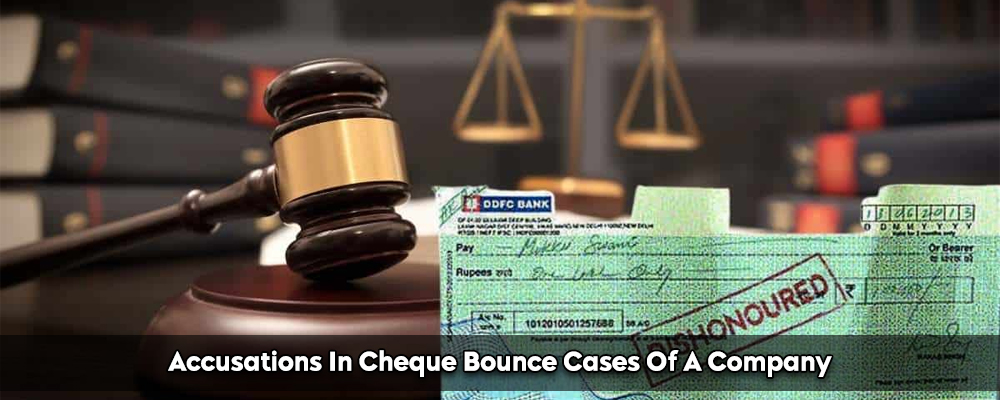The Negotiable Instruments Act, 1999 (NI Act) is a fundamental legislative framework that controls how negotiable instruments like cheques are used and managed in India. Regarding the responsibility of employees in charge of a company’s activities in situations involving bounced cheques, a crucial legal argument has recently come to light. Whether anyone connected to a firm can be held liable purely because of their function in overseeing the company’s operations is the central topic at hand.
Section 138 Negotiable Instruments Act
The NI Act acts as a thorough legal framework, outlining the regulations governing the issue, acceptance, and resolution of negotiable instruments. Particularly focusing on cases of dishonoured checks and describing the legal repercussions for such violations is Section 138 of the Act. However, the question of whether those in charge of the company’s activities can be found criminally accountable in accordance with the NI Act arises when a dishonoured cheque is connected to a corporate body.
Need A Legal Advice
The internet is not a lawyer and neither are you. Talk to a real lawyer about your legal issue

Who Cannot Be Accused In Cheque Bounce Cases?
It is crucial to distinguish between those who can and cannot be accused in cheque bounce cases involving a company based on their jobs, duties, and participation in the company’s financial operations. People who usually aren’t accusable in these situations are as follows-
- Those who cannot legally sign cheques on the company’s behalf and are not authorized signatories
- Employees who do not occupy managerial roles and who do not have the authority to make financial decisions are known as “Ordinary Employees” and are either clueless or not involved in the issuance of cheques
- Innocent Directors who can prove they had no knowledge of or involvement in the issue of cheques and had no culpable intent
- People not linked to the cheque transactions who are involved in the company’s operations on the outside, such as consumers or vendors
- Shareholders who have no managerial or operational responsibilities for the company and who are not directly involved in financial transactions
- Supervising Managers who have been authorized by a court to supervise the operations of the company, particularly in insolvency or legal matters
- Statutory Compliance Officers with no control over making financial or cheque-issuing decisions but are in charge of assuring regulatory compliance.
- People who lack the legal competence to conduct financial operations or exercise authority on the company’s behalf
- Immaterial Signatories whose signatures on the cheque were either falsified or unrelated to the specific transaction
- People whose approval was not sought for the cheque’s issuing, making their participation unlawful or involuntary
- People who are not actively engaged at the time the cheque was issued, in the everyday affairs or financial management of the company.
Role of Judiciary Supreme Court
- In the case of Ashok Shewakramani v State Of Andhra Pradesh, the Supreme Court held that the idea that a company is a separate legal entity from its board of directors or members, made it clear that just because someone is in charge of managing a company does not automatically make them personally responsible for the responsibilities of the business, including the issuing of dishonoured cheques.
- The Supreme Court underlined that there must be convincing proof of a person’s direct involvement in the occurrences that led to the dishonoured cheque in order for them to be held responsible under the NI Act. According to the court’s decision, a person will not be charged with a crime based only on the position or title they hold within a company.
- The court’s decision established “reasonable cause to believe” as the criteria for assessing an individual’s liability. A person suspected of a crime may be exempted from criminal responsibility if they can show that they were entitled to a good reason to expect the cheque would be honoured.
The decision of the Supreme Court has broad ramifications for both the company community and the judicial system dealing with situations of cheque bounce. This decision finds a compromise between upholding the rule of law and avoiding the abuse of it to harass innocent people.
Conclusion
In cases concerning dishonoured cheques and people running a company’s operations, the Supreme Court’s ruling on the interpretation of the NI Act brought clarity, equality, and balance to a body of legislation that had been clouded by ambiguity. The court’s decision strengthens the credibility of the legal system while fostering an atmosphere that is favourable to entrepreneurship and economic advancement by upholding the concept of corporate liability and setting a high bar for personal criminal liability.
One can talk to lawyer from Lead India for any kind of legal advice. In India, free legal advice online is obtainable at Lead India. Along with receiving free legal advice online, one can also ask questions to the experts online free through Lead India.





 Talk to a Lawyer
Talk to a Lawyer